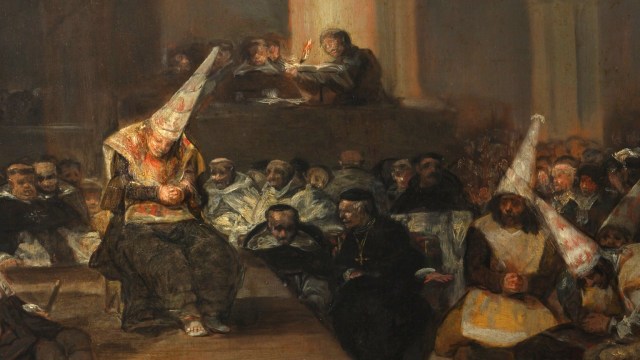How did history’s geniuses make their money?

- The greatest geniuses of history did not often make their fortunes from their intellect. They made ends meet through side hustles, part-time jobs, and labor.
- Newton was a banker, Shakespeare was fined for not paying his taxes, Curie took on three jobs, and Descartes was a military engineer. Academia rarely pays the bills.
- If we want to progress and nurture brilliance, then we need to, as a society, subsidize the great minds of tomorrow.
Lucky are those who get paid to do what they love. As the saying goes, “if you find a job that you love, you’ll never have to work a day in your life.” But few can survive from a labor of love, alone. Artists, writers, musicians, dancers, actors, or collectors all around the world wish they could make enough from their passions to get by. Sadly, life has a habit of demanding of us what we don’t want to give. So, we most of us end up working so that we can play.
The same applied for many of the greatest artists, scientists, innovators, and thinkers. The geniuses of history had to pay the bills and feed the family, just as much as we all do. Of course, a lot of the “greatest people” of all time had a lot of help; they were lords or baronesses, heirs to fortunes, or aristocratic rakes swaddled in the opium haze of high society.
Others, though, were of much more humble backgrounds. Here are four examples of how some of the biggest names in history earned their way in life.
Isaac Newton
Newton has a good claim to be one of the most learned and intelligent men in history. And yet, his family were farmers, and his father was an uneducated man who couldn’t even sign his own name.
Newton went to Cambridge University as a “sizar”, which essentially means he had to earn his tuition by being a servant to other students. He was basically Will from Good Will Hunting. When a plague sent all students back home, Newton spent the time revolutionizing mathematics, optics, physics, and astronomy. Unsurprisingly, when he returned he was given academic posts.
But academia then (as now) did not make you millions. After years of hard work, pressure from the Catholic King James II (Newton was resolutely and vocally Protestant), and a nervous breakdown, Newton decided to give it all up and simply make a fortune. In London, Newton used his mathematical mind to become Master of the Royal Mint. In today’s money, it was likely a seven-digit-salary job. So, despite writing what is recognized as one the of greatest scientific works of all time, Newton made his money mostly from being a government banker.
William Shakespeare
The player’s life is hard. It means long hours and having to do two (sometimes three) performances of the same play, day in and day out, for what is usually pretty modest pay. Today’s actors report significantly higher levels of depression, anxiety, and stress than the average population. Things were little different in 17th-century England.
For the man who would come to be widely recognized as history’s greatest writer, poet, playwright and wordsmith, Shakespeare did not live a gilded life of mansions, wine, and fine horses.
Shakespeare’s dad, with a bit of surplus from his dodgy, black market trade in wool, gave young William the money for the shares in his first theatrical company. The company muddled along, earning well enough, but never making anyone especially rich. Shakespeare was never paid as a writer of plays, but he took his money from how well (or badly) the entire acting troupe was doing. If the actors were rubbish, or a show got a bad review, Shakespeare would have struggled as much as the leading man.
There are very few records about Shakespeare, but two mention how he got into trouble, twice, for not paying his taxes. Whether this was from duplicity, negligence, or lack of money, we can’t be sure. But what we do know is that at his death, Shakespeare lived in a good house, but not huge. His purchases dropped off late in life, and he sold his shares in the theater company, presumably to give him more disposable income. A huge throw away from the luxurious life even a middling Hollywood screenwriter lives, today.
Marie Curie
If you go to enough quizzes in your life, you’re bound to eventually get the question, “Who was the first person to score two Nobel prizes in two different fields?” The answer: Marie Curie. If ever there were a proper rags-to-riches story, it’s Marie Curie.
Curie was one of five children, and her dad financially ruined the family after a series of awful investments. At 17, Marie took up three jobs — as a teacher, as a reader to workers, and as a governess — so that she could fund not only her education but her sister’s, too. When she made it to the Sorbonne, in Paris, she often worked so hard into the night that she forgot to eat. It was here that she was awarded various research grants to study steel (then, as now, a lucrative area).
When Marie’s husband died after being run over by a horse and carriage, she took over his job, and so became the first ever female professor at the Sorbonne. But after winning Nobel Prizes for physics and chemistry, money was no longer an issue. In today’s numbers, her 1903 prize is worth roughly $550,000. And she won two of them. Rather than waste it all in a high-octane life of celebrity, Curie did exactly what you’d expect: spent it on creating research institutions.
Albert Einstein is thought to have said, “Of all celebrated beings, [Curie is] the only one whom fame has not corrupted.”
Rene Descartes
Descartes’ mother died when he was one. The philosopher’s dad, a local politician, was too busy and too poor to look after Rene and his siblings. After being sent away to receive a good (if strict) education under the Jesuits, Descartes flourished as a proper Renaissance genius would when he got to university. But long nights, squinting at small text by candlelight, and undoing the Aristotelian scientific model is not great for anyone’s mental health. Descartes left university life after a probable nervous breakdown, and with not much jingling in his coin pouch.
But with a whopping intellect comes plenty of opportunities. He made a bit of money using probability theory to rinse people at cards in Paris before he joined the army. Descartes was not some dandy in a military jacket, but instead turned his mathematical prowess into good-old-fashioned killing machines (and nothing in human history is more valuable than killing machines). While in the army, Descartes designed all sorts of defensive fortifications, siege engines, and lethal hydraulics to help his employer, Prince Maurice of Nassau.
In spite of all his multi-discipline genius, Descartes ended his life on the run and at the mercy of anyone who would take him in. Not only did his philosophical works walk very closely to heresy at times, but his “mechanistic” view of the human body was a middle finger up at the church. It seemed 17th-century Europe was not ready for Descartes.
Running at half capacity
The sad truth about genius is that it doesn’t pay the bills. Behind every great thinker, discovery, invention, or work or art there lies either very long hours in tedious work or a whopping inheritance and estate.
The fact is that genius needs time and money to grow. It’s depressing to think how many artists, scientists, writers, or philosophers we’ve lost simply because they were too busy working to feed their kids. How often has genius wasted away cleaning dishes or making the bed?
The question is especially pertinent for women in academia. The English philosopher Mary Wollstonecraft argued that if society forces women to be second-class citizens — locked away, under-educated, and under-employed — then progress will only be running at half capacity. (Wollstonecraft was, herself, lucky enough to have a very wealthy household.) If you give more people more opportunities, you’ll get more output.
State sponsorship, university grants, private patronage, and government subsidy are all necessary if genius is to flourish. We need to make it as easy as possible for brilliant people to do brilliant things.
Jonny Thomson runs a popular Instagram account called Mini Philosophy (@philosophyminis). His first book is Mini Philosophy: A Small Book of Big Ideas.




